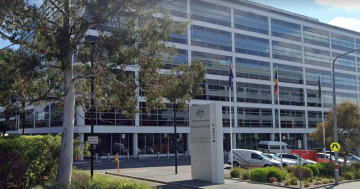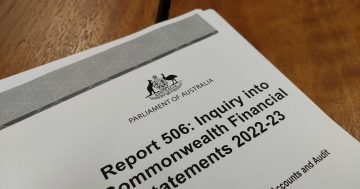
Before retiring as Department of Health and Aged Care secretary, Brendan Murphy responded to a capability review of the department. Photo: File.
Middle management in the Department of Health and Aged Care is struggling with a flexible workforce post-COVID and the ever-growing numbers of staff working from home.
Personnel turnover at the department is unusually high and recruitment excruciatingly long, resulting in a loss of corporate knowledge, poor induction processes and a failure to build trusting work relationships.
These are just some of the findings of the newly published independent capability review of the health department, which highly commends the agency’s response to the pandemic but also highlights serious concerns going forward.
“The department has a challenge to maintain its high levels of engagement and at the same time manage the implications of its highly flexible approach to working from home,” the report states.
“Middle managers do not yet have the requisite tools and ability to manage a highly devolved workforce.
“The review team believes that overall the department has done some excellent work in this domain, but this needs to be balanced with a strategic approach to workforce planning and development, and investment in leadership and management skills to deliver on the promise of its work from home policy.”
The review, commissioned by the Australian Public Service Commission, was conducted by Department of Infrastructure deputy secretary David Hallinan and former senior public servants Andrew Tongue and Larry Kamener – in collaboration with the health department and the APSC.
It is the first capability review of the department since 2014 and is the first under the reintroduction of the revised report cards.
Reviewers conducted staff workshops and also sought the views of a range of internal and external stakeholders.
A high level of frustration was expressed about outsourcing and the impact it was having on the department.
“There is a concern from both internal and external stakeholders about the department’s capabilities,” the report said.
“During staff workshops conducted by the review team, every cohort expressed frustration and concern with the recruitment process.
“A key frustration was the length of time it takes to recruit staff, with many indicating that by the time the department was able to offer a position to an applicant, they had already moved on and accepted a position elsewhere, so the department ‘simply missed the boat’.
“Attracting the right people is another key frustration. Due to the competitive labour market, it has become increasingly difficult to attract and retain staff with the right skills for the department.
“There is a sense that the traditional recruitment approaches used by most managers are not effectively identifying people who are the right fit for the department. Additionally, there is a need to balance specialists and generalists.”
One senior staff member quoted in the report said the department was not recruiting for the right skillset.
“I want problem solvers and multidisciplinary skills. I want environmental management that can be applied to health. I want creativity. We quash it,” they said.
“Is it a Health or a public service problem? How to foster that creativity?”
The induction element of onboarding was also identified through the review as a capability gap.
Resoundingly, the report states, the review team heard that in many cases this element simply did not happen.
External stakeholders found this flaw particularly worrying, describing it as a dual concern to emerge from the movement of staff.
“Not only is there limited scope to leverage working relationships built on trust, but also a lack of corporate knowledge being built and then passed on,” the report states.
“We consistently heard stakeholders express their desire for the stability that comes from working consistently with familiar staff.”
The review team also, however, found some significant positives in the department, praising staff for how engaged they are with their work and for how they stepped up during the pandemic.
“The department overall has very good staff engagement with scores higher than the average across the APS,” they said.
“Staff are proud of their efforts at the centre of the COVID-19 response.”
Their report suggested the department should improve leadership development and management of underperformance.
Before retiring as department secretary, Brendan Murphy formally responded to the review.
In his response, which is included in the report, Dr Murphy describes the culture inside the health department as strong and said it looked forward to implementing actions for improvement suggested by the review – including concerning resourcing implications.
“The last few years have been both challenging and rewarding for the department. The intellect, talent and dedication of staff is impressive, and they have delivered outstanding collective achievements,” he said.
The review acknowledges the extraordinary efforts of the department throughout the COVID-19 pandemic. I will always be proud of how our staff contributed to achieving Australia’s world-leading health outcomes.”
Original Article published by Chris Johnson on Riotact.











